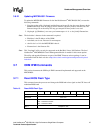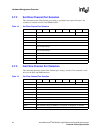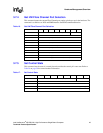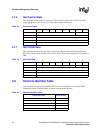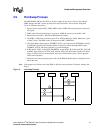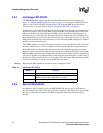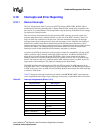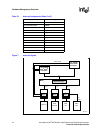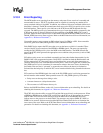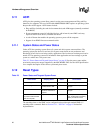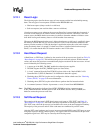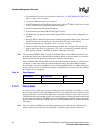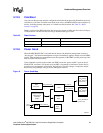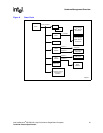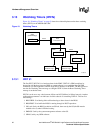
Intel NetStructure
®
MPCBL0001 High Performance Single Board Computer 55
Technical Product Specification
Hardware Management Overview
3.10.2 Error Reporting
The MCH handles error reporting from the memory subsystem. Errors consist of correctable and
uncorrectable bit errors. The ECC algorithms used are capable of correcting any number of bit
errors contained within a 4-bit nibble. In addition, any number of bit errors contained within two 4-
bit nibbles is detected. The MCH communicates these errors to the ICH3 via special cycles over the
hub link interface. These special cycles indicate to the ICH3 that an MCH-detected error has
occurred. The MCH special cycle communicates the type of event that should be generated by the
ICH3 when an error is detected. Selection for the generation of an SERR, SMI, or SCI event is
provided. Status for these reported errors is then found in the MCH DRAM_FERR (first error) and
DRAM_NERR (next error) status registers. Refer to the MCH data sheet for more information (see
Appendix A, “Reference Documents”).
Correctable memory errors generate an SMI and are logged via IPMI as a SEL. Non-correctable
errors first generate an SMI (which generates a SEL) and then an NMI.
Each P64H2 device reports the PCI errors that occur on the buses to which it is attached. These
consist of the PCI error assertions of the PERR# or SERR# signals. The errors are reported by
sending the DO_SERR special cycle to the MCH on the Hub Interface. The MCH forwards the
error to the ICH3, which generates the appropriate error condition to the processor(s) such as NMI,
SMI, or SCI.
PCI address parity errors are considered catastrophic and may abort further data transfers by the
P64H2 if that is the programmed response. Parity/ECC is checked on both the Hub Interface and
PCI bus transactions. PCI data parity errors are considered less severe and allow transactions to
continue. Data parity errors cause the Detected Parity Error” status to be logged and, if enabled, the
DO_SERR special cycle is transmitted. In a transaction where a data error occurs, the data being
forwarded to the next bus is “poisoned” to ensure the error follows the data to its destination.
Poisoned data has bad parity or multi-bit ECC errors introduced before being forwarded to the next
bus.
PCI assertions of the SERR# signal also result in the DO_SERR special cycle being generated on
the hub interface when enabled. Other potential causes for a DO_SERR special cycle include:
• Parity errors on the target bus during a write.
• A master timeout on a delayed transaction.
• The occurrence of a PCI master abort cycle.
Refer to the P64H2 Data Sheet, section 4.9, for more information on error handling. For details on
obtaining this document, see Appendix A, “Reference Documents.”
The ICH3 device has the ability to report PCI and hub link errors directly to the processors. When
a PERR# or SERR# occurs on the ICH3 local PCI bus, the ICH3 can be programmed to generate
NMI or SMI. The ICH3 also fields messages from the MCH and its attached hub devices to
indicate errors to the processors on their behalf. The messages may request SMI#, SCI, NMI, or
SERR3 to be asserted. Software must check the MCH and attached hub devices to determine the
exact cause of the error. Refer to the ICH3 Data Sheet for more information on error handling and
generation. For details on obtaining this document, see Appendix A, “Reference Documents.”



